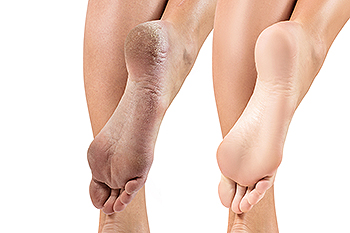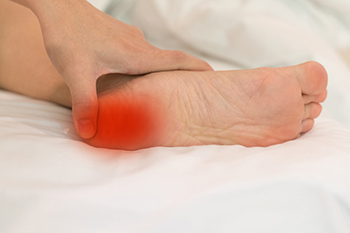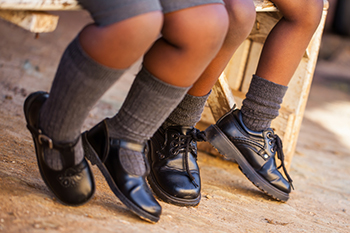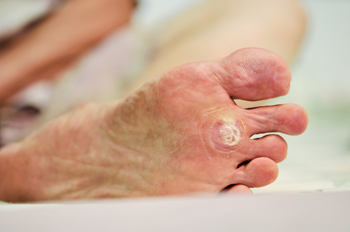Connect With Us
Blog
Items filtered by date: December 2022
Certain Medical Conditions May Cause Cracked Heels

Cracked heels is a common foot condition that is unsightly and often causes pain and discomfort. There are several reasons for cracked heels to develop. Once this is known, effective preventive methods can be implemented. Weight gain, walking barefoot, or standing on hard surfaces for the majority of the day may cause cracked heels. Remedies can include having extra cushioning in the shoes if it is mandatory to stand all day, losing added weight, and wearing shoes that can protect the feet from outside environments. Some people have medical conditions that may lead to getting cracked heels, consisting of psoriasis or eczema. Taking prescribed medications may help the body’s immune system to improve, which may prevent cracked heels. If you have developed this condition, it is urged that you seek the counsel of a podiatrist who can recommend relief options, and inform you of additional prevention techniques.
If the skin on your feet starts to crack, you may want to see a podiatrist to find treatment. If you have any concerns, contact Dr. Sunny Sajjad, DPM, MS, DABPM from Virginia Run Foot & Ankle . Our doctor can provide the care you need to keep you pain-free and on your feet.
Cracked Heels
It is important to moisturize your cracked heels in order to prevent pain, bleeding, and infection. The reason cracked heels form is because the skin on the foot is too dry to support the immense pressure placed on them. When the foot expands, the dry skin on the foot begins to split.
Ways to Help Heal Them
- Invest in a good foot cream
- Try Using Petroleum Jelly
- Ease up on Soaps
- Drink Plenty of Water
Ways to Prevent Cracked Heels
- Moisturize After Showering
- Skip a Shower
- Keep Shower Water Lukewarm
- Don’t Scrub Your Feet
If you are unsure how to proceed in treating cracked heels, seek guidance from a podiatrist. Your doctor will help you with any questions or information you may need.
If you have any questions, please feel free to contact our office located in Leesburg, VA . We offer the newest diagnostic and treatment technologies for all your foot care needs.
Gout Pain Can Be Managed
Active Children and Sever’s Disease

The foot condition that is known as Sever’s disease can affect children and young teenagers who participate in running and jumping activities. It is considered to be an ailment that comes from overuse in and around the growth plate in the heel. The child may complain of having heel pain, and can have difficulty in walking. A podiatrist can perform a proper diagnosis, which consists of having a physical examination done, in addition to learning about the child's choice of activities. The child will eventually outgrow Sever’s disease, and until then, mild relief can be found when the activity that caused this condition is temporarily stopped. Patients may also find that it helps to elevate the affected foot as often as possible, and it may be beneficial to wear a heel pad in the shoe. It is strongly suggested that your child sees a podiatrist at the first sign of heel pain, so a proper diagnosis can be performed, and the correct treatment can promptly begin.
Sever's disease often occurs in children and teens. If your child is experiencing foot or ankle pain, see Dr. Sunny Sajjad, DPM, MS, DABPM from Virginia Run Foot & Ankle . Our doctor can treat your child’s foot and ankle needs.
Sever’s Disease
Sever’s disease is also known as calcaneal apophysitis, which is a medical condition that causes heel pain I none or both feet. The disease is known to affect children between the ages of 8 and 14.
Sever’s disease occurs when part of the child’s heel known as the growth plate (calcaneal epiphysis) is attached to the Achilles tendon. This area can suffer injury when the muscles and tendons of the growing foot do not keep pace with bone growth. Therefore, the constant pain which one experiences at the back of the heel will make the child unable to put any weight on the heel. The child is then forced to walk on their toes.
Symptoms
Acute pain – Pain associated with Sever’s disease is usually felt in the heel when the child engages in physical activity such as walking, jumping and or running.
Highly active – Children who are very active are among the most susceptible in experiencing Sever’s disease, because of the stress and tension placed on their feet.
If you have any questions, please feel free to contact our office located in Leesburg, VA . We offer the newest diagnostic and treatment technologies for all your foot and ankle injuries.
Choosing the Right Shoes for Your Child

Keeping children in shoes can be challenging because their feet grow so rapidly. Here are some tips for finding the right shoes for your child. Check their shoes regularly for worn areas, seams that are stretched, and toes that are worn out. These may be signs that their shoes need to be replaced. Have the child’s foot measured each time they try on shoes so that both the length and the width are taken into account. There should be about half an inch between the end of the shoe and the toes. Avoid buying shoes that are too big for the child as this can cause falls. The heel of the shoe should fit snugly, but not too tightly. For best results, avoid the idea of breaking in the shoes at home, and instead, make sure the shoe fits well at the store. Discourage your child from wearing shoes with higher heels, as this may affect the development of healthy feet and legs. Instead, go for shoes with flatter, textured soles that can keep them from slipping and falling. For more information on the best shoes for your child, please consult a podiatrist.
The health of a child’s feet is vital to their overall well-being. If you have any questions regarding foot health, contact Dr. Sunny Sajjad, DPM, MS, DABPM of Virginia Run Foot & Ankle . Our doctor can provide the care you need to keep you pain-free and on your feet.
Tips for Keeping Children's Feet Healthy
- Make sure their shoes fit properly
- Look for any signs of in-toeing or out-toeing
- Check to see if they have Clubfoot (condition that affects your child’s foot and ankle, twisting the heel and toes inward) which is one of the most common nonmajor birth defects.
- Lightly cover your baby’s feet (Tight covers may keep your baby from moving their feet freely, and could prevent normal development)
- Allow your toddler to go shoeless (Shoes can be restricting for a young child’s foot)
- Cut toenails straight across to avoid ingrown toenails
- Keep your child’s foot clean and dry
- Cover cuts and scrapes. Wash any scratches with soap and water and cover them with a bandage until they’ve healed.
If you have any questions, please feel free to contact our office located in Leesburg, VA . We offer the newest diagnostic and treatment technologies for all your foot care needs.
Mosaic-Type Plantar Warts

Plantar warts are significantly different from other types of regular warts. Plantar warts specifically appear as though they are growing into the skin, rather than simply growing on the skin. There are two different types of plantar warts to be aware of, mosaic-type plantar warts and myrmecial-type plantar warts. The former kind is particularly interesting. Mosaic-type plantar warts derive their name from the fact that the warts appear in groups and clusters on the feet. Unlike myrmecial-type plantar warts, this kind of plantar wart is less deep in the skin and is also smaller. Nevertheless, having plantar warts is not something to necessarily take lightly. If you think that you have plantar warts, contact a podiatrist today for treatment.
Plantar warts can be very uncomfortable. If you need your feet checked, contact Dr. Sunny Sajjad, DPM, MS, DABPM from Virginia Run Foot & Ankle . Our doctor will assist you with all of your foot and ankle needs.
About Plantar Warts
Plantar warts are the result of HPV, or human papillomavirus, getting into open wounds on the feet. They are mostly found on the heels or balls of the feet.
While plantar warts are generally harmless, those experiencing excessive pain or those suffering from diabetes or a compromised immune system require immediate medical care. Plantar warts are easily diagnosed, usually through scraping off a bit of rough skin or by getting a biopsy.
Symptoms
- Lesions on the bottom of your feet, usually rough and grainy
- Hard or thick callused spots
- Wart seeds, which are small clotted blood vessels that look like little black spots
- Pain, discomfort, or tenderness of your feet when walking or standing
Treatment
- Freezing
- Electric tool removal
- Laser Treatment
- Topical Creams (prescription only)
- Over-the-counter medications
To help prevent developing plantar warts, avoid walking barefoot over abrasive surfaces that can cause cuts or wounds for HPV to get into. Avoiding direct contact with other warts, as well as not picking or rubbing existing warts, can help prevent the further spread of plantar warts. However, if you think you have developed plantar warts, speak to your podiatrist. He or she can diagnose the warts on your feet and recommend the appropriate treatment options.
If you have any questions please feel free to contact our office located in Leesburg, VA . We offer the newest diagnostic and treatment technologies for all your foot and ankle needs.

